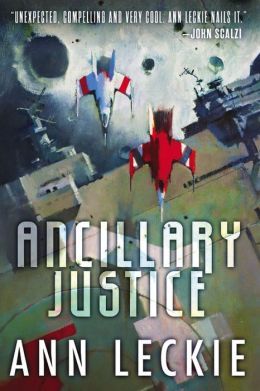 On a remote, icy planet, the soldier known as Breq is drawing closer to completing her quest. Once, she was the Justice of Toren - a colossal starship with an artificial intelligence linking thousands of soldiers in the service of the Radch, the empire that conquered the galaxy. Now, an act of treachery has ripped it all away, leaving her with one fragile human body, unanswered questions, and a burning desire for vengeance.
On a remote, icy planet, the soldier known as Breq is drawing closer to completing her quest. Once, she was the Justice of Toren - a colossal starship with an artificial intelligence linking thousands of soldiers in the service of the Radch, the empire that conquered the galaxy. Now, an act of treachery has ripped it all away, leaving her with one fragile human body, unanswered questions, and a burning desire for vengeance.
I was initially intrigued by the concept of a ship's AI out for revenge, but hesitated when the hype machine started rolling. When something gets hyped up, I tend to keep my distance until things cool down. I won't say I regretted waiting, but I can see where the praise (and backlash) came from.
The story is told from the POV of the starship Justice of Toren. Each of these massive ship's is run by an AI that not only embodies the ship, but thousands of its cyborgs (basically mindwiped POWs), known as ancillaries. So during the flashback chapters, Justice of Toren is in multiple places at once. I thought Leckie did a great job with managing this as the narrator always specified which ancillary (they have designations) was observing which scene.
But with an AI as narrator, we're given a character that isn't human and thus doesn't make for an easy read. The AI isn't going to wax poetic about the view, nor will it pay attention to a person's physical features unless they're relevant. We get a very clinical description of other characters' behavior, and the AI's algorithms determine said behavior to mean a particular state of mind. Reading other reviews, I see that turned some people off. It can be dull and repetitive, but I appreciated it. This is how I'd expect an AI to narrate.
Then there's the whole matter of gender. The Radch Empire, or rather their language, doesn't acknowledge gender, so the default pronoun is "she" (though "it" would've been more accurate). There were scenes were Justice of Toren was required to speak in other languages and guess the proper pronoun to use. It wasn't always successful. To readers, it was such a surprise that some praised it for its radical linguistic treatment of gender. Some critics saw this as some liberal plot; others just found it confusing. I was in the latter camp until I got used to it and figured out characters' genders.
As I mentioned earlier, the plot can be boiled down to "AI seeks revenge." But revenge implies an emotional response. So while the AI won't describe the sunset, it can develop emotional attachments to certain humans. Justice of Toren mentions that some ships became attached to their captains and became catastrophically despondent upon their deaths. There's no explanation for how these AIs came into existence (the story is set at least several thousand years in the future), but I got the impression that emotion wasn't in their programming (obeying orders is though). I found this part, the AI wrestling with emotions and programming, the most enjoyable.
The other disturbing part of the Radch, besides its conversion of POWs as ancillaries, was the fact that it was a surveillance state. Cameras were everywhere, recording everything. One misspoken sentence could have dire consequences. I'll leave it at that. Saying anymore would reveal too much of the story.
One last thing I have to mention: What is up with everyone drinking tea all the time? Holy crap! There was one reference to some sailors returning from shore leave flat out drunk, but otherwise it's all about bowls of tea.
Overall, I really enjoyed the story. It wasn't an easy read, but it was an honest one. By that I mean, I really had to follow the dialogue to pick up the clues. I think that Leckie did a great job providing us with a conflicted AI (the best since 2001's HAL?), but I recognize that it won't be everyone's cup of tea (Sorry, couldn't help myself).
\_/
DED
No comments:
Post a Comment